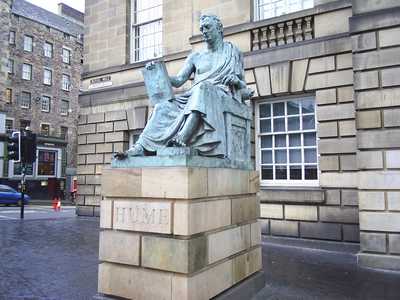
An essay of mind and numbers
One of David Hume’s most notable ideas was his theory of causation, which he explored in his first novel, the Treatise of Human Nature, first published anonymously in 1739[i]. Hume re-explored the idea in An Enquiry Concerning Human Understanding, which was published in Edinburgh amongst a various number of his works in 1777[ii], one year after his death[iii]. In section IV of the Enquiry, Hume summarizes the modern empirical version of causation of his time[iv]. Aptly known as ‘Hume’s Fork’[v], the famed philosopher divides the human ideas of causality into two separate parts: the first are those ideas of the human race that can be proven by experimentation without exception.
Concepts, such as mathematics, which cannot be proven wrong when questioned. The second groups of “objects of human reason or enquiry,”[vi] are facts. They are separated by the simple idea that the mind can conceive a contradictory statement, which can be conceived by the mind based on a priori[vii], a prior experience. Hume uses the example of a billiard ball,[viii] where the movement can be predicted based on prior experience (it is here that I argue that the billiard ball can be grouped into the former category as well, based on the mathematics of angles to help predict where the ball goes; although it is quite unlikely for one to pull out a protractor during a simple game of billiards) Some are simply easy assurances.
One example of this is the fact that the sun will come up in the morning. In Hume’s day, the idea in which every cause has an effect is crucial, so as in education, and in this case there is no known cause and effect. For example, the sun goes down, and then, in the morning it comes up. However, when one is arguing the fact that the sun will come up, is the cause that the sun went down? Thus, in this case, the reasoning of causality of the sun going down at night can’t be described by a priori, unlike the billiard ball, where the outcome can be predicted by a cause and effect statement. We know now the reason of the sun appearing to rise and set as the day goes on, but then it Hume’s time it was not common knowledge.
However, Hume believes that our inferences based on experience do not come from reasoning, because there is no “medium”[ix] from which it can be drawn. Hume wonders, “what is our idea of necessity, when we say that two objects are necessarily connected together…”[x] In the case of sunrise, it can be induced that because we have seen the sun rise after it sets several times, then it is “evidently going in a circle.”[xi]
Thus, it is assumed that the future will be like that past, and it is not induced or experimental, yet it is still a fact based on an easy assurance. One of the most crucial points Hume has is that “There are no ideas, which occur in metaphysics, more obscure and uncertain than those of power, force, energy, or necessary connection, of which it is every moment necessary for us to treat in all our disquisitions.”[xii] Things we do not entirely understand. So how does everyone in the human race learn to infer events from the past to the future without logic to validate it?
It is a commonly known cliché that ‘everything has a cause and an effect’. This statement is generally used to argue the effects, in an a priori way, looking backwards from the effect to find its cause. As humans, it can be argued that we are all born as in a tabula rasa[xiii] or blank slates for brains, and that all learning comes from sensory perception and experiences. As we grow, our curiosity gets the better of us, and we test various theories. For example, watch a child; he will test something once (the cause), and then test it again and again, before forming the conclusion that the object will continue to create an effect until the circumstances surrounding it change, that is a main concern for education. However, I believe that when a person gets older, he merely assumes that his prediction will be correct because of the prior experience. As a race, become more educated, learned how to use mathematics (which are extraordinarily present in physics, chemistry and biology) to make explain phenomenon’s that we once just assumed. As we get accustomed to a certain cause leading to an effect, triggering a chain of causes and effects leading to the main event, we no longer need to associate each event repetitively, as it merely becomes knowledge in our minds.
Another argument that can be made is that perhaps the innate ability to make that necessary connection is embedded into our minds before we are born, that we perhaps were not tabula rasa, and that in our evolution through time we came equipped with this intuitive mind, and curiosity befell us naturally. However this "equipment" is related with education. This natural evolution has allowed us to create ideas, such as math, which do not evolve the world, but allow the human race control it, to survive. In recent years this instinctive curiosity has allowed mankind to discover why the sun rises in the morning, and sets in the fall. It allows us to find the patterns occurring in everyday lives that many humans just assume will continue into the future, but now know why.
I believe that the curiosity of the human race, the mind, and as our society continues to progress learning more, and becoming more knowledgeable, we will be able to explain considerable amounts more. But then, as circumstances change so do we. Is there any answer to Hume’s skepticism? Until causation can be grouped into the ideas of the human race that can be proven by experimentation without exception, we will never know.
________________________________________________________
[i] Steve Thomas, “A Treatise of Human Nature: By David Hume”, ebooks@adelaide, 02/07/2006, 04/15/2009,
[v] Ibid
[vi] Penelhum, 64
[vii] James H. Noxon, Hume’s Philosophical Development (London: Oxford University Press, 1973), 59
[viii] Penelhum, 101
[ix] Penelhum, 102
[x] Rupert Read and Kenneth A. Richman, The New Hume Debate: Revised Edition (New York: Routledge, 2007), 215
[xi] Ibid
[xii] Ibid
[xiii] “Tabula Rasa”, Wikipedia, 04/20/2009,
BIBLIOGRAPHY
[i] Steve Thomas, “A Treatise of Human Nature: By David Hume”, ebooks@adelaide, 02/07/2006, 04/15/2009,
[v] Ibid
[vi] Penelhum, 64
[vii] James H. Noxon, Hume’s Philosophical Development (London: Oxford University Press, 1973), 59
[viii] Penelhum, 101
[ix] Penelhum, 102
[x] Rupert Read and Kenneth A. Richman, The New Hume Debate: Revised Edition (New York: Routledge, 2007), 215
[xi] Ibid
[xii] Ibid
[xiii] “Tabula Rasa”, Wikipedia, 04/20/2009,
BIBLIOGRAPHY
Thomas, Steve. “A Treatise of Human Nature: By David Hume. ebooks@adelaide. 07 February 2006. 15 April 2009 , <>
Thomas, Steve. “An Enquiry Concerning Human Understanding. ebooks@adelaide. 07 February 2006. 15 April 2009 , <>
“David Hume” Wikipedia, the free encyclopedia. 16 April 2009. http://en.wikipedia.org/wiki/David_Hume
“Tabula Rasa” Wikipedia, the free encyclopedia. 20 April 2009. http://en.wikipedia.org/wiki/Tabula_Rasa
Penelhum, Terrence. David Hume: an introduction to his philosophical system. West Lafayette, Indiana: Purdue University Press, 1992
Noxon, James H. Hume’s Philosophical Development. London: Oxford University Press, 1973
Read, Rupert and Kenneth A. Richman. The New Hume Debate: Revised Edition. New York: Routledge, 2007
Read, Rupert and Kenneth A. Richman. The New Hume Debate: Revised Edition. New York: Routledge, 2007
Image designed by:
Patricia Ávila
From:







Muy interesante análisis, sobre todo me llama la atención la parte en que se propone la posiblidad de una posiblidad natural de identificar y conocer lo verdadero, suponiendo que haya educación; probablemente una buena educación justamente saca ese potencial de la naturaleza humana.
ReplyDeleteBuen ensayo en especial la opinión sobre el pensamiento de David Hume de que la realidad de lo exacto en las matemáticas no se puede esperar en otros conocimientos.
ReplyDeleteEl argumento del autor que menciona que muchos conocimientos "de otros campos" muchas veces tienen bases matemáticas es muy intresante. Justamente creo que demuestra como ambas cosas conviven, lo exacto con lo que aparentmente no lo es; la dificultad para demostrar algo no significa que sea menos verdadero.
Permettez-moi de vous présenter les SERVICES DE FINANCEMENT LE-MERIDIAN. Nous sommes directement dans le financement de prêt et de projet (s) pur en termes d'investissement. Nous fournissons des solutions de financement aux entreprises et aux particuliers souhaitant accéder à des fonds sur les marchés des capitaux, tels que le pétrole et le gaz, l’immobilier, les énergies renouvelables, les produits pharmaceutiques, les soins de santé, les transports, la construction, les hôtels, etc. Nous pouvons financer jusqu’à 900 000 000 000 $ ( Neuf cent millions de dollars) dans toutes les régions du monde, dans la mesure où notre retour sur investissement de 1,9% peut être garanti sur les projets.
ReplyDeleteService de financement Le Meridian.
Email Contact info@lemeridianfds.com
WhatsApp ... + 19893943740.